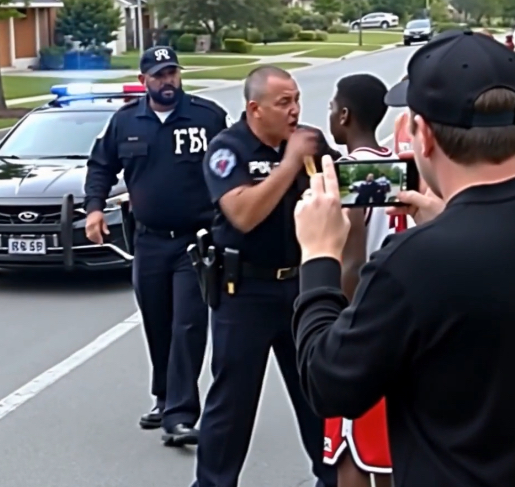 The atmosphere in the precinct transformed instantly. The aura of authority that David Carter carried was palpable, and even those who didn’t know him could sense that he was not a man to be trifled with. Reed, who had been reveling in his power just moments before, now looked like a deer caught in headlights.
The atmosphere in the precinct transformed instantly. The aura of authority that David Carter carried was palpable, and even those who didn’t know him could sense that he was not a man to be trifled with. Reed, who had been reveling in his power just moments before, now looked like a deer caught in headlights.
“What’s going on here?” Captain Johnson, head of the precinct, demanded as he stepped out of his office, alerted by the commotion. His eyes widened slightly when he saw Agent Carter standing in his precinct. He knew this was serious.
Reed, attempting to regain his composure, stammered, “Captain, I—”
“Save it,” Johnson cut him off, his voice sharp. “Agent Carter, what can we do for you?”
“My son, Jamal Carter, was wrongfully arrested and assaulted by your officer,” Carter stated, his voice steady but laced with an undercurrent of anger. “I demand his immediate release, and I expect a full investigation into this matter.”
Jamal, sitting in the interrogation room, felt a surge of relief but also a simmering anger. The brutality he suffered was not just about him; it was about something much larger, something that had happened too often to people who didn’t have an FBI agent for a father.
The captain nodded, sensing the gravity of the situation. “Of course, we’ll get him released immediately, and I assure you, we’ll look into this thoroughly.”
As Jamal was uncuffed and stepped into the hallway, his father met his gaze. Jamal saw the relief mixed with anger and determination in his father’s eyes. He was safe, but he knew his father wouldn’t let this slide.
Reed, now visibly sweating, attempted to explain himself. “I thought he was a suspect. He matched the description,” he mumbled, avoiding eye contact.
Agent Carter leveled a steely gaze at him. “What description was that? Black, young, and existing in public?” His voice was calm, but every word was a dagger.
Reed opened his mouth to respond, but no words came out. There was nothing he could say to justify his actions.
As Jamal and his father walked out of the precinct, Carter turned back to the captain. “I expect you to handle this appropriately. If not, I will.”
The captain nodded, understanding the unspoken message. This incident wouldn’t be buried or ignored; it would be scrutinized, and there would be consequences.
The ride home was quiet, but it was a silence filled with unspoken words and mutual understanding. Jamal knew his father would fight this battle, not just for him but for every other kid who couldn’t make that call.
In the following days, the community rallied around Jamal. The videos recorded by bystanders went viral, sparking protests and demands for change. The local news picked up the story, and soon, it was a topic of national conversation.
Officer Reed was suspended pending investigation, and an internal review was launched into the conduct of the precinct as a whole. Jamal’s story became a catalyst for change—a reminder of the power of community, the importance of accountability, and the necessity for systemic reform in law enforcement practices.
Jamal knew this was only the beginning, but for the first time since that terrifying afternoon, he felt hopeful. Not just for himself, but for a future where kids like him could walk home without fear.